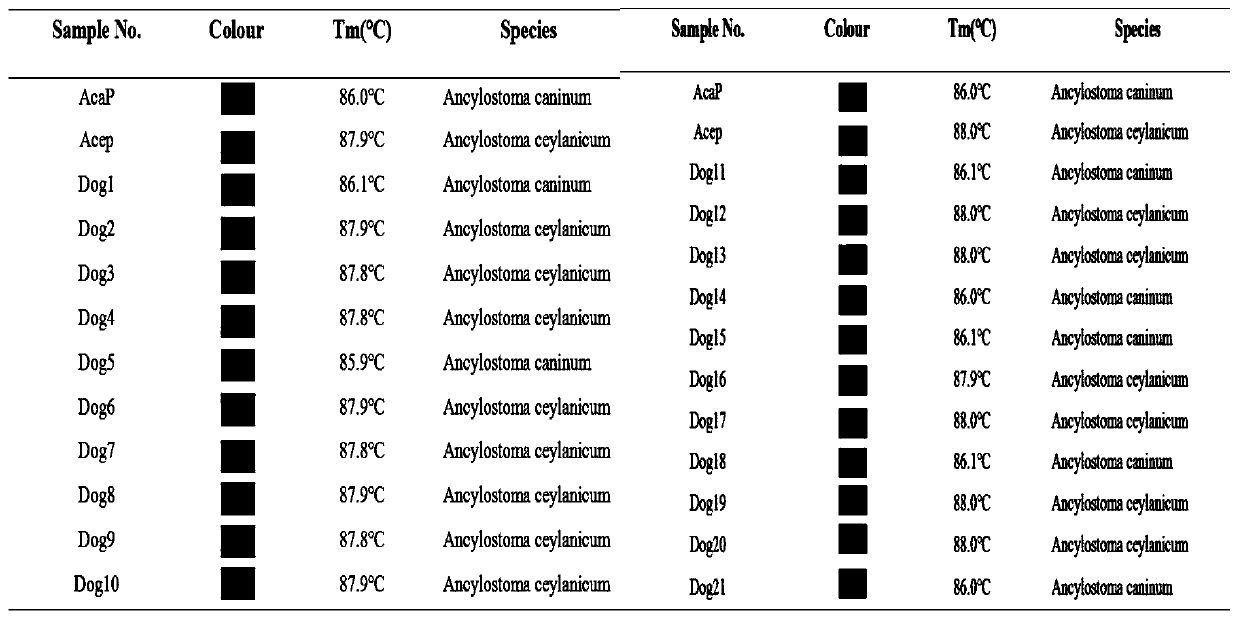SNP molecular marker its71, primers and applications for detecting Ancylostoma ceylonii and Ancylostoma canis
A hookworm and molecular marker technology, applied in the field of hookworm disease diagnosis and detection, can solve the problems of high cost, inability to detect a large number of samples at the same time, cumbersome operation, etc., and achieve the effect of completely consistent accuracy and sequence results
- Summary
- Abstract
- Description
- Claims
- Application Information
AI Technical Summary
Problems solved by technology
Method used
Image
Examples
Embodiment 1
[0048] Embodiment 1. The identification of canine Ancylostoma ceyloni and Ancylostoma canis
[0049] (1) First, refer to the ITS sequences of Ancylostoma caninum (LC177192.1) and Ancylostoma ceylonum (KM066110.1) downloaded from NCBI, and design a set of T m -shift PCR primers (2 forward specific primers and 1 common reverse primer), see Table 1.
[0050] Table 1 T based on ITS1 sequence SNP site ITS71 m -shift primer
[0051]
[0052] According to the above primers to establish T m The reaction system (Table 2) and reaction conditions of -shift PCR:
[0053] Table 2 T m -shift PCR reaction system
[0054]
[0055] Reaction conditions:
[0056]
[0057] The melting process is 70-95°C, 0.5°C / s.
[0058] (2) T based on SNP site ITS71 m -shift primers for AceP and AcaP standard plasmids m -shift standard curve see figure 1 . The results showed that the T based on the SNP site ITS71 m The -shift method can distinguish Ancylostoma ceyloni from Ancylostoma canis...
Embodiment 2
[0059] Example 2.T m Stability test of -shift method
[0060] To evaluate the established SNP site ITS71-based T m The stability of the -shift method was tested for the repeatability of the two known plasmid standards constructed. Each sample was tested 7 times within a batch and 3 times between batches. qPCR-T m -shift reaction system and cycle parameters are the same as above. The test results showed that among the primers of ITS71, the T m The coefficients of variation (CV) of the values are 0.15% and 0.09% respectively (Table 3), so the T m The intra-assay repeatability and inter-assay repeatability of -shift molecular detection method were both good.
[0061] Table 3 Repeatability test results
[0062]
Embodiment 3
[0063] Example 3.T m Sensitivity test of -shift method
[0064] To detect the established SNP site ITS71-based T m The sensitivity of the -shift method is to dilute the two prepared plasmid standards by 10 times, according to the ratio of 1:10 to 1:10. 8 Concentration detection, qPCR-T m -shift reaction system and cycle parameters are the same as above. The results showed that when the sample dilution of Ancylostoma caninum and Ancylostoma ceylonis as low as 1:10 7 (i.e. 5.33×10 -6 ng / μL and 5.03×10 -6 ng / μL), T m The -shift method can still distinguish the two (see Table 4).
[0065] Table 4 primers to different concentrations of Ancylostoma caninum and Ancylostoma ceyloni T m value
[0066]
[0067] Note: "-" indicates that the target peak cannot be detected
PUM
 Login to View More
Login to View More Abstract
Description
Claims
Application Information
 Login to View More
Login to View More - R&D
- Intellectual Property
- Life Sciences
- Materials
- Tech Scout
- Unparalleled Data Quality
- Higher Quality Content
- 60% Fewer Hallucinations
Browse by: Latest US Patents, China's latest patents, Technical Efficacy Thesaurus, Application Domain, Technology Topic, Popular Technical Reports.
© 2025 PatSnap. All rights reserved.Legal|Privacy policy|Modern Slavery Act Transparency Statement|Sitemap|About US| Contact US: help@patsnap.com



